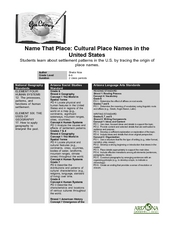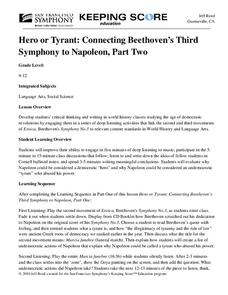Curated OER
Go for the Gold!
The options are vast with this Ancient Greece and Olympics research project! Using Scholastic online resources, historians have interactive and educational supports to guide them through researching and writing about the 2004 Olympics in...
Curated OER
Deep Roots of Ancient Greece
Young scholars investigate Greek contributions to modern America. In this ancient Greek influence lesson, students watch videos, listen to lectures, and conduct research regarding ancient Greek ideals in order to analyze and trace Greek...
Curated OER
The Greek Gods
What were the early Greek myths? Have elementary students examine the Persian Wars and read various Greek myth in order to identify the cause and the results of the Persian Wars. Myths, activities, simulations, and a unit plan are links...
Curated OER
Tracing the Roots of Modern Cities
Students identify several key inventions and other forms of technology that were part of city life during the classical Roman and Greek periods. They report on one characteristic or invention that is shared by modern and ancient cities.
Curated OER
Michigan History of Philanthropy
Students investigate how philanthropy began in Michigan. In this philanthropy lesson plan, students read Michigan History of Philanthropy and read a timeline of several events. Students create a picture with a sentence about a time when...
Curated OER
Early Greeks-Unit Test
In this social studies activity, 7th graders focus on Early Greeks. Students respond to a total of 30 matching, multiple choice, and fill in the blank questions.
Curated OER
Islamic Roots of Judaeo-Christian Culture
Students discuss the stereotypes associated with the major religions of the world. Using primary sources, they summarize the information and role play various roles to the class. They participate in a debate between the different points...
Curated OER
Doing Our Share Lesson 1: Michigan History of Philanthropy
Students research the history of philanthropy in Michigan by looking at images and pictures while discussing the definition of philanthropy. They design a picture of the first time they saw a philanthropic act and write three sentences...
Curated OER
War and International Law: A Brief History of the Law of War
Students investigate the history of the law of war. In this international law activity, students listen to a lecture regarding the history of international law spanning from Pax Romana to Collective Security. Students respond...
Curated OER
The Rise of the City States in Greece
Sixth graders examine Ancient Greece and its development of democracy. In this Greek History lesson, 6th graders explore the rise of city-states in Greece and its overall effect on the development of democracy. The class continues with...
Curated OER
The Far Reaches of Greek Culture
Ninth graders study the culture of Greece. In this World History lesson, 9th graders research specific data in relation to Greece. Students create a presentation of their findings for their class.
Texas Education Agency (TEA)
Byzantine Architecture
View Byzantine architecture from the comfort of your classroom. A PowerPoint presentation introduces important vocabulary terms and examples of Byzantine architecture in the ninth lesson of the 11-part series. A Jeopardy game reviews...
Curated OER
19c European Liberalism
If you'd like to prompt some great discussions in your history class, this presentation will surely get your class talking. Addressing 19th century liberalism in Europe (including influences from England, France, America, and Ireland),...
Curated OER
Ancient Greece: The Olympics and the Gods
Research Ancient Greece, the Olympic games, and Greek mythology. Young historians will research Ancient Greece and complete multiple activities about the history and culture. This is a unit of lessons.
Curated OER
The Olympics Return Home
Middle schoolers compare the ancient Olympic Games with the modern version of the event. They study the history of the Games and observe how they have changed through time.
Curated OER
Flying with Pythagoras
A lengthy narrative about Pythagoras and his students precedes an activity in which your young mathematicians practice using the Pythagorean theorem to solve three problems about flight and distance. Answers are provided.
Curated OER
Ancient Greece: Athens as a City State
Sixth graders find Greece on the map and recognize how the geography of Greece was important in its development. In this ancient Greece lesson, 6th graders research Greece and compare to the civilization of ancient Egypt. Students answer...
Curated OER
Sparta and Athens
Sixth graders study Ancient Greece. In this Ancient Greece lesson, 6th graders complete 16 lessons to learn about Ancient Greece. Students complete a quiz for assessment.
Curated OER
Daily Life in Ancient Greece
Sixth graders discover what everyday life was like for Ancient Greeks. In this Greek history lesson, 6th graders examine the cultural diversity of Ancient Greece and how it affected daily life for its citizens.
Curated OER
Birthday Customs
Students are introduced to the customs and origins of a variety of common birthday celebrations. They work in groups to research common birthday customs and history and then make individual books highlighting a custom that has meaning to...
Curated OER
Name That Place: Cultural Place Names in the United States
Young scholars examine the origin of the people that settled in the United States. In this United States History instructional activity, students work in small groups to complete several activities that explore early settlement,...
Curated OER
Lasting Legacies of Ancient Greece
Ancient Greece lesson plans can open up a world of information for students.
San Francisco Symphony
Hero or Tyrant: Connecting Beethoven’s Third Symphony to Napoleon, Part Two
Was Napoleon a tyrant or a hero? Answers could vary depending on the political point of view. Learners listen to Beethoven's Symphony #3 while considering Napoleon's undemocratic tyranny. They listen to the piece in five parts, each time...
Curated OER
Things That Stick Out Or: How To Find Your Way Around on a Map
Students explain the meaning of and recognize the map outlines of a peninsula, an isthmus, and a cape.























